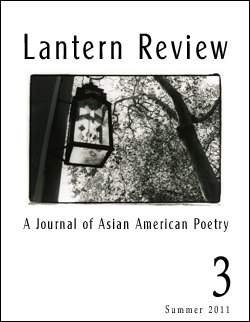
Andre Yang is a Hmong American poet from Fresno, California. He is a founding member of the Hmong American Writers’ Circle (HAWC), where he actively conducts and participates in public writing workshops. He completed the Creative Writing (Poetry) MFA program at California State University, Fresno, where he was a Philip Levine Scholar, recipient of the Academy of American Poets-sponsored Ernesto Trejo Prize, and the Graduate Dean’s Medalist of the College of Arts and Humanities. Andre is a Kundiman Asian American Poetry Fellow, and has attended the Tin House Summer Writers Workshop, the Napa Valley Writers’ Conference, and recently completed an artist residency at the Ucross Foundation. He co-edited How Do I Begin – A Hmong American Literary Anthology (Heyday, 2011), and his poetry has appeared in Paj Ntaub Voice, Beltway Poetry Quarterly, and the chapbook anthology ‘Here is a Pen’ (Achiote Press).
For APIA Heritage Month 2012, we are revisiting our Process Profile series, in which contemporary Asian American poets discuss their craft, focusing on their process for a single poem from inception to publication. This year, we’ve asked several Lantern Review contributors to discuss their process for composing a poem that we’ve published. In this installment, Andre Yang discusses his poem “Why I Feel the Way I Do About SB 1070,” which appeared in Issue 3 of Lantern Review.
* * *
In a way, I have been writing this poem all my life, and considering all the things I discuss in the poem, it really does span my life. The poem was written to express my feelings about the inception and implementation Arizona’s Senate Bill 1070, though I also wanted it to capture my thoughts on the interconnectedness of humanity.
I might not have written “Why I Feel The Way I Do About SB 1070” had I not met Francisco Xavier Alarcón at his Ce Uno One book launch in Sacramento, California. I overheard Francisco saying he was attending the Association of Writers and Writing Programs (AWP) Conference later that year in Washington D.C. (2011), and since I too was planning to attend the conference, I used that as a conversation starter and approached him. He mentioned that while in D.C., he would be organizing two off-site Floricanto readings based on his Facebook page, “Poets Responding to SB 1070,” and that well-established poets like Martín Espada would be taking part in the reading. Five minutes into the conversation, he asked, to my complete surprise, if I wanted to participate in the readings. I said I’d be honored, and told him I’d contact him when I felt I had a poem worthy of the purpose.
Continue reading “Process Profile: Andre Yang Discusses “Why I Feel the Way I Do About SB 1070””


